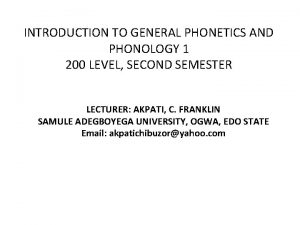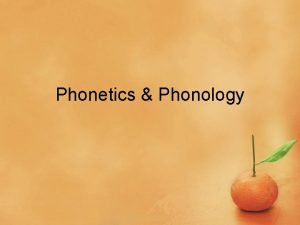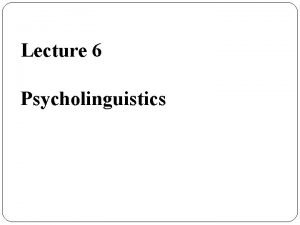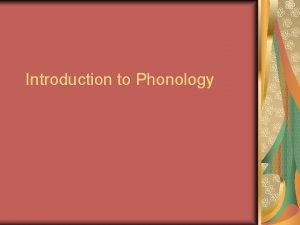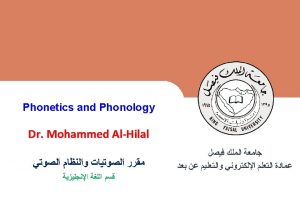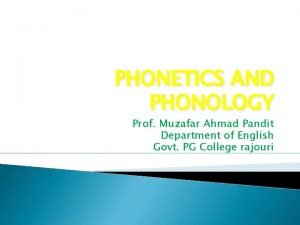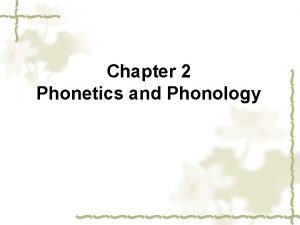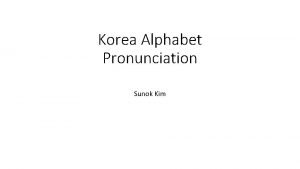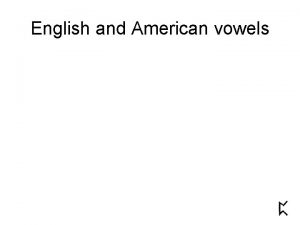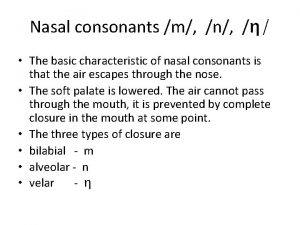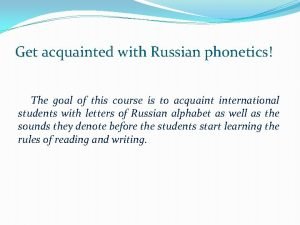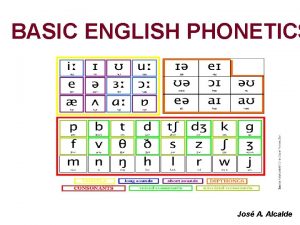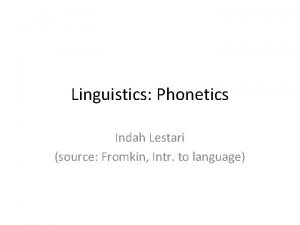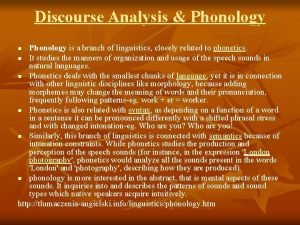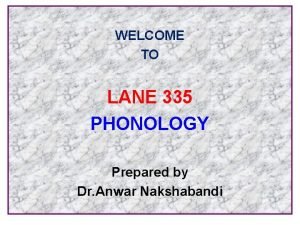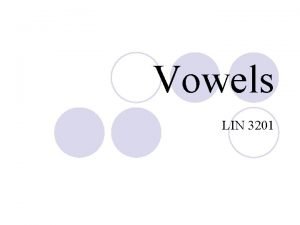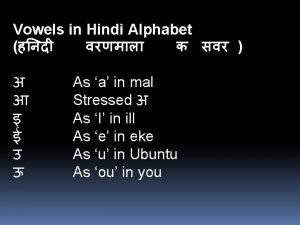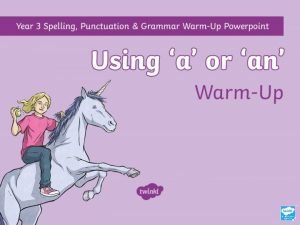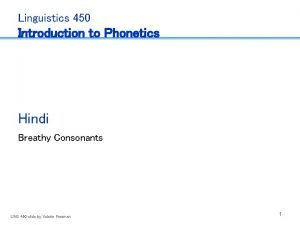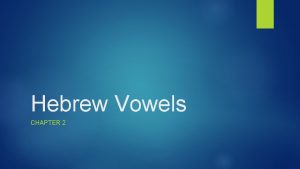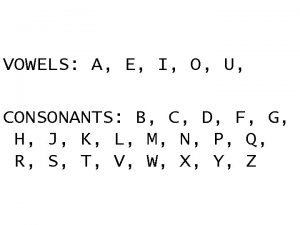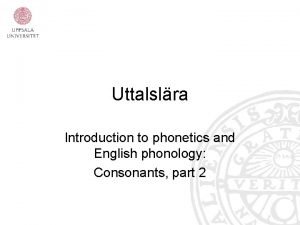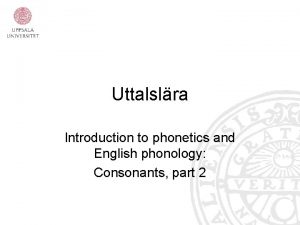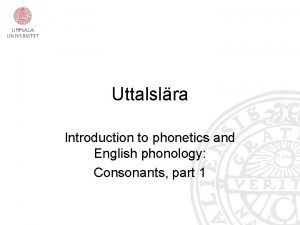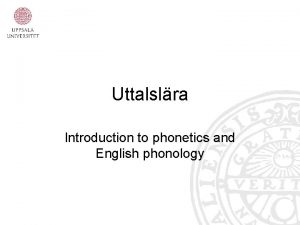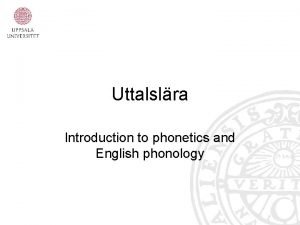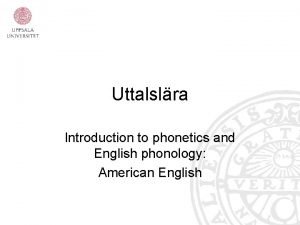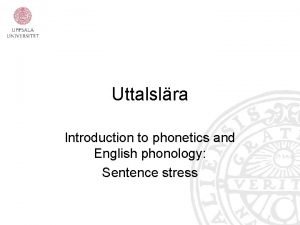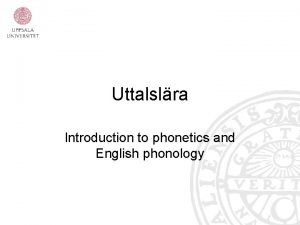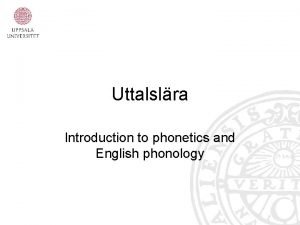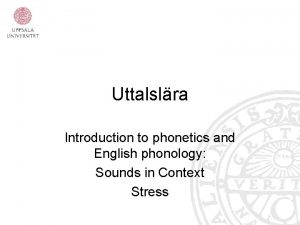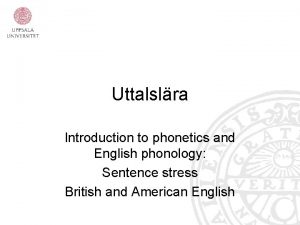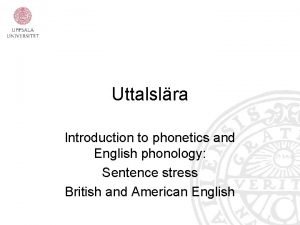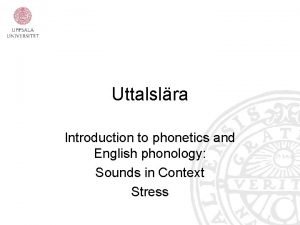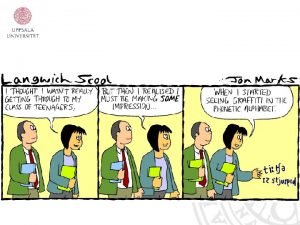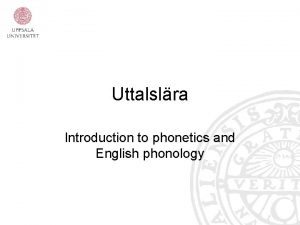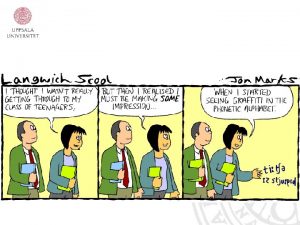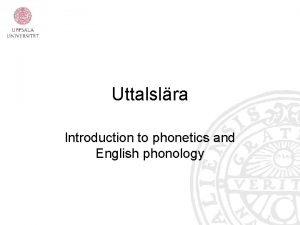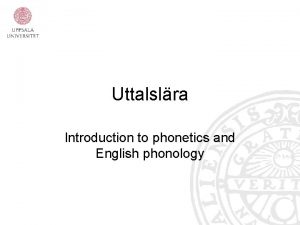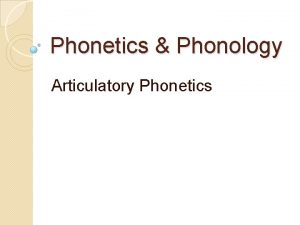Uttalslra Introduction to phonetics and English phonology Consonants

































- Slides: 33

Uttalslära Introduction to phonetics and English phonology: Consonants

Consonants Produced by obstructing the airstream through the oral cavity. Can be voiced or voiceless

Mute consonants Some words are spelled with one or more consonants that are not pronounced. thumb Christmas sigh /θʌm/ /'krısməs/ /saı/

Two ways of describing consonants • The place in the mouth (for instance dentals – produced with the tongue touching the teeth) • The manner of articulation (for instance fricatives – produced by creating friction in the mouth)

Types of consonants • Plosives (stops) • Fricatives • Nasals • Affricates • Semi-vowels

The consonants of English 1 Plosives Fricatives Nasals Voiceless /p/ pet /k/ kite /t/ take /f/ fan /s/ so /ʃ/ shore /θ/ thin /h/ hat Voiced /b/ bag /g/ bag /d/ dog /v/ van /z/ zoo /ʒ/ vision /ð/ then /m/ men /n/ men /ŋ/ sing

The consonants of English 2 Affricates Voiceless Voiced /tʃ/ church /dʒ/ judge Semi-vowels /w/ well /j/ yes Lateral /l/ long Frictionless continuant /r/ rose

Plosives Also known as stops. The flow of air is completely blocked and then released all at once. English has six plosives; three voiced and three voiceless.

The English plosives Voiceless /p/ pin /t/ tin /k/ coat Voiced /b/ bin /d/ din /g/ goat

/p/ as in pin, /b/ as in bin “p” is mute in words with pn- and pspsalm /sɑ: m/ pneumonia /nju: 'məʊnıə/ “b” is mute in most words with -mb thumb /θʌm/, climb /klaım/ “b” is also mute in subtle /sʌtl/, doubt /daʊt/

/t/ as in tin, /d/ as in din Pronunciation: the tip of the tongue not touching the teeth “t” is mute in some words with -stlisten /'lısən/ castle /'kɑ: s(ə)l || 'kæs(ə)l/ Christmas /'krısməs/ “d” is mute in a few words handkerchief /'hæŋkərtʃɪf/ Wednesday /'wenzdeı/

/k/ as in coat Spellings: k, c, qu king /'kıŋ/ cane /keın/ liquid /'lıkwıd/ quay /ki: / “k” is mute in words with knknight /naıt/ knit /nıt/

/g/ as in goat “g” is mute in words with gn- or -gn: gnat /nat/ reign /reın/ sign /saın/ There also other pronunciations of the letter “g”.

Fricatives The flow of air is partially blocked, to create friction. English has nine fricatives; four voiced and five voiceless.

The English fricatives Voiceless /f/ fan /s/ so /ʃ/ shore /θ/ thin /h/ hat Voiced /v/ van /z/ zoo /ʒ/ vision /ð/ then

/f/ as in fan, /v/ as in van /f/ Spelling: f, ph, gh Phil enough /fıl/ /ı'nʌf/ /v/ Spelling: v Important contrast between /v/ and /w/ ! Note: of /ɒv||ʌv/

/v/ as in van Many native English-speakers have problems counting how many times the letter “f” occurs in a sentence like Finished files are the result of years of scientific study. That is because “of” is pronounced with /v/, and many people don’t notice the letter “f” in the word “of”.

/s/ as in so Spellings: c, ss, sc, s-, sometimes -s cease advice miss sing /si: s/ /əd'vaıs/ /mıs/ /sıŋ/

/z/ as in zoo Spellings: z, sometimes s seize keys has is /si: z/ /ki: z/ /hæz/ /iz/

/ʃ/ as in shore Spellings: sh, -ti-, -ci-, -si-, sometimes ch machine Asia ancient Charlotte /mə'ʃi: n/ /'eıʃə/ /'eınʃənt/ /'ʃɑ: (r)lət/

/ʒ/ as in pleasure Spellings: -su-, -sion (preceded by a vowel), -ge treasure television prestige /'treʒə/ /'teləvıʒən/ /prə'sti: ʒ/

/θ/ as in thin Spelling: th faith Thursday thin cathedral /feıθ/ /'θɜ: (r)zdeı/ /θın/ /kə'θi: drəl/

/ð/ as in then Spelling: th Important to know when to use /ð/ and when to use /θ/! then brother breathe /ðen/ /'brʌðə(r)/ /bri: ð/ (but: breath /breθ/ )

/h/ as in hat “h” is mute in some words vehicle shepherd Birmingham heir /vi: ıkl/ /'ʃepəd/ /'bɜ: (r)mıŋəm/ /eə(r)/

Nasals When producing a nasal, we let the air flow through the nose instead of the mouth. English has three nasals, all of them voiced.

/m/ as in me Examples: summer /'sʌmə(r)/

/n/ as in not Pronunciation: the tip of the tongue not touching the teeth “n” is mute in words with -mn: condemn /kən'dem/ hymn /hım/ damn /dæm/

/ŋ/ as in king The spelling “ng” is sometimes pronounced /ŋ/ and sometimes /ŋg/ herring singing angry hunger /'herıŋ/ /'sıŋıŋ/ /'æŋgrı/ /'hʌŋgə(r)/

Affricates Consist of a plosive followed by a fricative. English has two affricates; one voiced and one voiceless.

/tʃ/ as in church Spellings: ch cheese /tʃi: z/ China /'tʃaınə/ children /'tʃıldrən/

/ʃ/ versus /tʃ/ sheep /ʃi: p/ cheap ship /ʃıp/ chip Charlotte /'ʃɑ: (r)lət/ Charles Talk is not sheep! /tʃi: p/ /tʃıp/ /tʃɑ: lz/

/dʒ/ as in judge Spellings: j, g, ge geography /dʒı'ɒgrəfı||dʒı'ɑ: grəfı/ jeans jam ridge /dʒi: nz/ /dʒæm/ /rıdʒ/

Thank you for listening!
 Introduction to general phonetics and phonology
Introduction to general phonetics and phonology What is phonetics
What is phonetics Difference between phonetics and phonology
Difference between phonetics and phonology Allophones examples
Allophones examples Phonetics and phonology
Phonetics and phonology A concise introduction to linguistics answer key
A concise introduction to linguistics answer key Drc model of reading
Drc model of reading Terminal devoicing
Terminal devoicing Phonetics and phonemics
Phonetics and phonemics Elearning
Elearning Phonetics and phonology
Phonetics and phonology Assimilation linguistics
Assimilation linguistics S phonetic alphabet
S phonetic alphabet Consonants in english and arabic
Consonants in english and arabic Combined vowels korean
Combined vowels korean Example of phonology
Example of phonology American english phonology
American english phonology International phonetic alphabet
International phonetic alphabet Set of consonants in the english alphabet
Set of consonants in the english alphabet Nasal consonants in english
Nasal consonants in english Unpaired consonants in english
Unpaired consonants in english Basic english phonetics
Basic english phonetics Define phonetics in english
Define phonetics in english Discourse analysis and phonology
Discourse analysis and phonology Juncture examples
Juncture examples Difference between vowels and consonants
Difference between vowels and consonants Difference between consonant and vowel
Difference between consonant and vowel Vowels and consonants in hindi
Vowels and consonants in hindi Weak syllables are
Weak syllables are Difference between a vowel and a consonant
Difference between a vowel and a consonant Consonant and vowel sort
Consonant and vowel sort Hindi ipa chart
Hindi ipa chart Hebrew vowels and consonants
Hebrew vowels and consonants Consonant letters
Consonant letters
